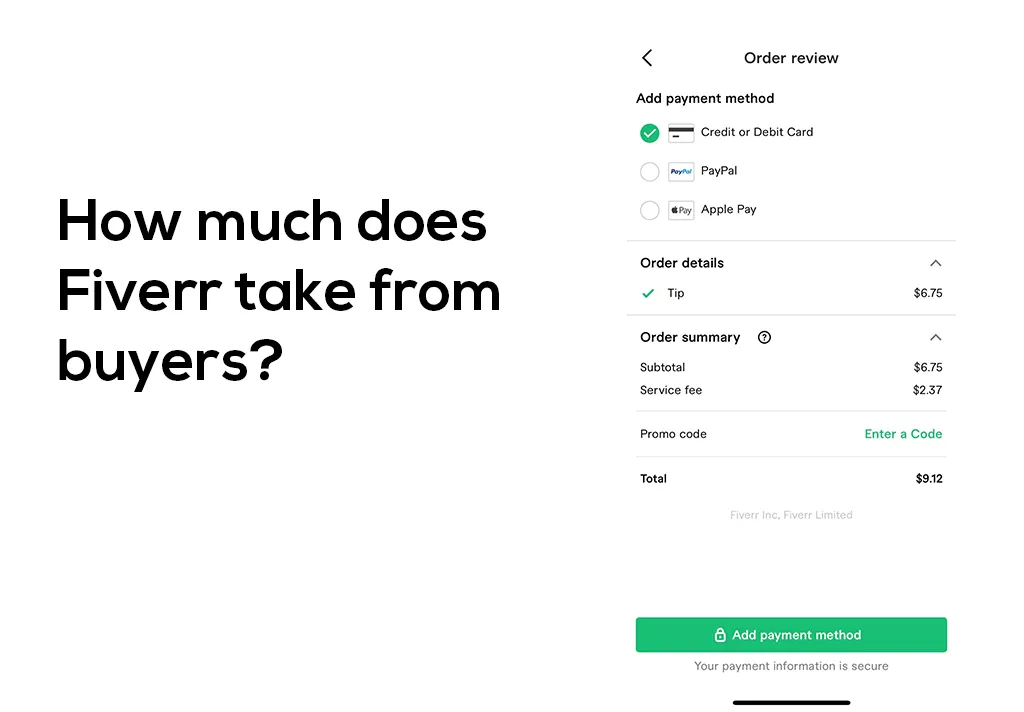In the digital age, Fiverr has emerged as a popular platform connecting freelancers with clients from around the globe. Whether you’re a graphic designer, writer, programmer, or musician, Fiverr provides an avenue to monetize your skills and reach a wider audience. But with great opportunities come certain responsibilities—particularly when it comes to earning money and understanding your tax obligations. So, let’s dive into what it really means to make money on Fiverr and how it impacts your taxes!
Understanding Tax Obligations as a Freelancer

If you’re earning income through Fiverr, it's essential to understand that you have tax obligations just like any traditional employee. Many freelancers assume that because they're independent contractors, they’re off the hook when it comes to taxes, but that isn’t the case!
Here’s what you need to know:
- Self-Employment Tax: As a freelancer, you are considered self-employed. This means that along with regular income tax, you are responsible for self-employment tax, which covers Social Security and Medicare. For the tax year 2023, the self-employment tax rate is 15.3%.
- Income Reporting: All income you earn through Fiverr must be reported to the IRS. If you earn more than $600 in a year from a single client, they will issue a 1099 form to you, which you should use to report your earnings.
- Deductions: Freelancers can deduct business-related expenses from their income, such as software, marketing costs, or even a portion of your home office. Keeping detailed records is crucial to maximize these deductions.
- Estimated Taxes: Since taxes aren’t withheld from your Fiverr payments, you may need to make estimated tax payments quarterly to avoid penalties. This is an essential part of managing your freelance income effectively.
In summary, understanding your tax obligations is just as important as making money on Fiverr. Taking the time to learn about your duties can save you from financial headaches down the line!
Also Read This: How to Cancel an Order on Fiverr: A Step-by-Step Guide
Does Fiverr Withhold Taxes from Your Earnings?

When you freelance on Fiverr, you might be wondering about tax implications. It's a common question, and the straightforward answer is: No, Fiverr does not automatically withhold taxes from your earnings. As a freelancer, you're considered an independent contractor, which means you're responsible for managing your own taxes. This includes setting aside a portion of your income to pay taxes when they’re due.
Here’s what to keep in mind:
- Independent Contractor Status: As a seller on Fiverr, you are classified as an independent contractor. Thus, you are solely responsible for reporting and paying your taxes.
- Eligible Tax Forms: Depending on your total earnings and location, you may need to fill out certain tax forms. For U.S. citizens, this is typically the IRS Form 1099 if you earn over a certain threshold during the calendar year.
- No Automatic Deductions: Unlike traditional employment, Fiverr does not deduct taxes from your payouts. It’s crucial to proactively plan for these payments, which can sometimes catch new freelancers off-guard.
In practical terms, when you receive payment for your services on Fiverr, you get the full amount. However, it’s wise to set aside a percentage—often 20-30%—of your earnings to cover your tax liability. Speaking with a tax professional can provide additional clarity tailored to your specific situation.
Also Read This: How to Calculate Order Completion Rate on Fiverr
How to Report Your Income from Fiverr
Reporting your income from Fiverr is a crucial step in fulfilling your tax obligations. While it may feel daunting at first, following a structured approach can help ease the process. Here’s how you can go about it:
- Keep Detailed Records: Always maintain a comprehensive record of your earnings and expenses related to your Fiverr freelance work. A simple spreadsheet can work wonders. Include:
- Date of transaction
- Services sold
- Payment received
- Any business-related expenses
- Choose Your Reporting Method: Depending on where you live, you might have different options for reporting your income. In the U.S., for example, you'll typically do this on your IRS Form 1040, Schedule C (Profit or Loss from Business).
- Review Relevant Tax Deductions: As a freelancer, you can deduct certain business expenses, which can reduce your taxable income. These may include:
- Software subscriptions
- Advertising costs
- Equipment and supplies
- Consult a Tax Professional: If you're feeling overwhelmed or unsure about how to proceed, don't hesitate to reach out to a tax professional. They can provide guidance tailored to your unique financial situation.
Remember, being organized and proactive about your taxes can save you a considerable headache down the road. Set reminders for tax deadlines, and don’t leave tax time until the last minute. Being prepared is the key to a smooth reporting experience!
Also Read This: Does Fiverr Post to LinkedIn?
Deductions You Can Claim as a Fiverr Seller
If you’re a Fiverr seller, you might be wondering how to keep more of your hard-earned money. Luckily, the good news is that you can claim certain deductions when filing your taxes. These deductions can significantly reduce your taxable income, meaning you end up paying less in taxes. Let’s dive into the deductions you can typically claim as a Fiverr seller:
- Business Supplies: Anything you purchase specifically for your Fiverr gigs—like software, graphics, or even a good microphone for voiceovers—can often be deducted.
- Marketing and Advertising: Costs related to promoting your Fiverr services, whether through social media ads or website hosting, are usually deductible.
- Internet and Phone Bills: A portion of your home internet and phone bills related to your Fiverr work can often be written off. Just be sure to keep track of your usage!
- Professional Services: If you've hired an accountant or any other professional to help with your taxes or business organization, their fees can often be deducted as well.
- Home Office Deduction: If you work from home, you might qualify for the home office deduction, which takes into account the space you dedicate to Fiverr-related tasks.
Always keep detailed records of your expenses throughout the year to make it easier when tax season rolls around. This not only helps you maximize your deductions but also substantiates your claims in case of an audit. Honestly, every little bit helps when you’re trying to take home more from your Fiverr earnings!
Also Read This: Does Fiverr Allow PayPal Credit?
Using Fiverr’s Tax Information for Filing
When it comes to filing your taxes as a Fiverr seller, you can utilize the tax information Fiverr provides to streamline the process. Fiverr is obligated to provide you with the necessary documentation to help clarify how much you’ve earned, which is crucial for a correct tax filing. Here’s what you need to know about using Fiverr’s tax information:
- 1099 Forms: If you earn over a certain threshold, Fiverr will issue a 1099 form. This form details your total income for the year, which you’ll need when filing your taxes.
- Withdrawal Records: Fiverr gives you access to your withdrawal history, which can be helpful to cross-reference your income. Keeping track of how much you’ve withdrawn can give you a clearer picture of your total earnings.
- Summary of Services: Fiverr may provide a summary of the services you offered, which can help you categorize your income and expenses more effectively.
When you receive your tax documents from Fiverr, review them carefully. Check for any discrepancies and, if something seems off, don’t hesitate to reach out to Fiverr’s support for clarification. By utilizing the tax information that Fiverr offers, you can make the filing process much smoother and ensure compliance with tax regulations. Remember, being organized and informed is key to navigating your tax obligations successfully!
Also Read This: How to Send Buyer Requests in Fiverr: A Step-by-Step Guide
7. Frequently Asked Questions about Fiverr and Taxes
When it comes to using Fiverr, many freelancers and clients have questions about the tax implications of their transactions. Here are some of the most frequently asked questions that can help clarify the situation:
- Does Fiverr deduct taxes from payments I receive?
No, Fiverr does not withhold taxes from your earnings. As a freelancer, you are responsible for handling your own tax obligations based on the income you earn from the platform.
- What tax forms can I expect from Fiverr?
If you earn over a certain threshold in the U.S., Fiverr will issue a 1099 form, but only if you're a U.S. taxpayer. If you're outside the U.S., you won’t receive this form, so you'll need to keep track of your income separately.
- How do I accurately report my Fiverr income?
Keep thorough records of all your earnings through Fiverr. You can use accounting software or even a simple spreadsheet to track your transactions. At tax time, report your earnings as self-employment income on your tax return.
- Are there any deductions I can take as a Fiverr freelancer?
Yes! You may be eligible for various deductions such as expenses for software, marketing, and even home office costs. It's advisable to consult a tax professional for personalized advice.
- What if I live outside the U.S.?
Even if you're not a U.S. resident, you still need to report your Fiverr income according to your country's tax laws. Check with your local tax authority for specific regulations.
Understanding these FAQs can empower you to better navigate the tax landscape while freelancing on Fiverr.
8. Conclusion: Staying Compliant with Tax Regulations
In conclusion, managing your taxes as a Fiverr freelancer may initially seem daunting, but staying compliant is crucial for your financial health and peace of mind. Here are a few important takeaways:
- Keep Accurate Records: Maintain detailed records of your earnings and expenses. A clear record will save you time and stress when tax season rolls around.
- Know Your Tax Obligations: Familiarize yourself with your local tax laws and what you may owe on your Fiverr earnings. Each region may have different requirements.
- Consider Professional Help: If you're uncertain about how to navigate your tax responsibilities, it might be worth consulting a tax professional. They can provide valuable insights suited to your unique situation.
- Use Tools to Stay Organized: Leverage accounting software or apps designed for freelancers. These tools can help streamline your processes and keep your financials in order.
Ultimately, by being proactive and informed, you can ensure that you meet your tax obligations while focusing on what really matters—growing your Fiverr freelance business.



